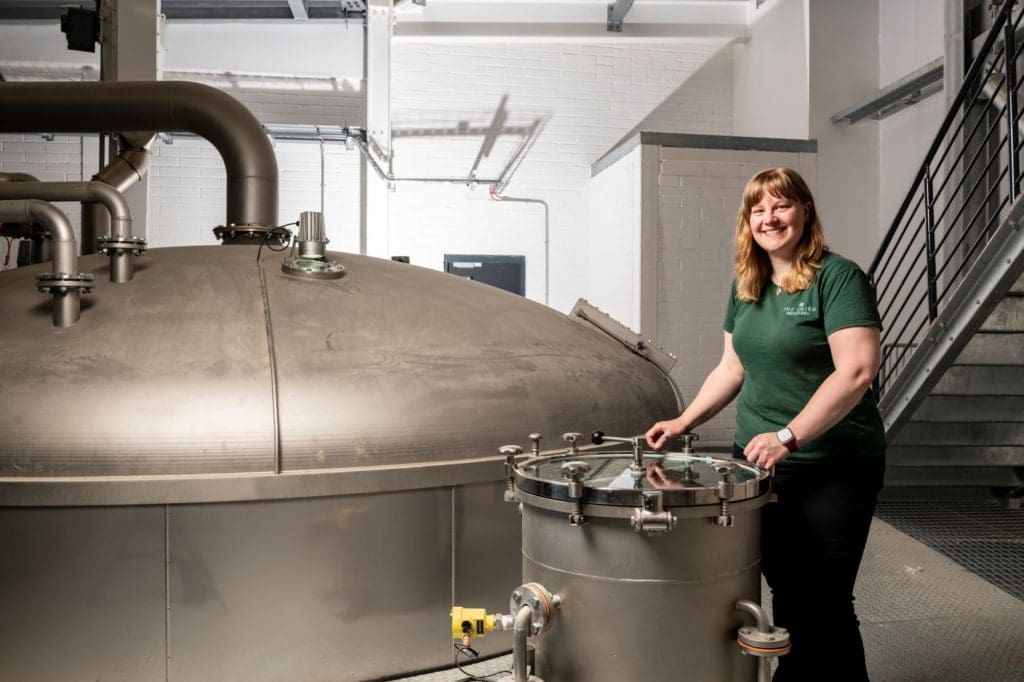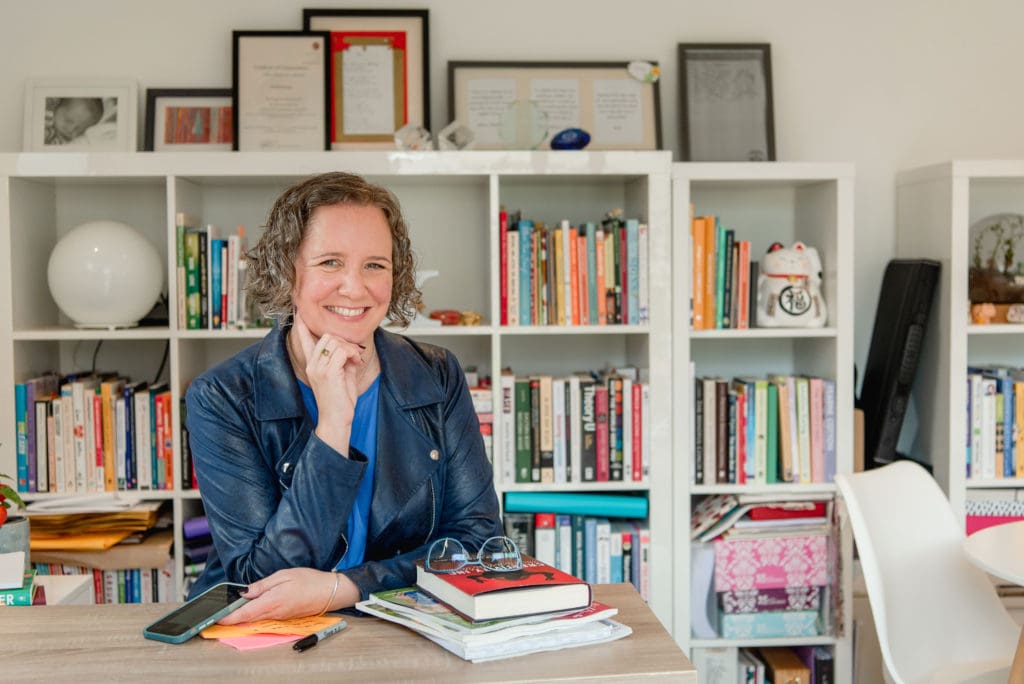In today’s ever-evolving job market, finding advice from experienced professionals can be invaluable for young people navigating their careers.
Scotland is home to many successful and inspiring business leaders who have made their mark in various sectors and industries. Whether they are entrepreneurs, innovators, or executives, they have valuable insights and experiences to share with the next generation of aspiring professionals.
We interviewed four Scottish business leaders who shared their career paths, tips, and advice for young people who want to pursue their dreams and goals.
Stefan Hunter, Founder of IOLLA

Stefan Hunter is the founder of IOLLA, a Glasgow-based eyewear brand that offers high-quality glasses at an affordable price. IOLLA was launched in 2015 with the aim of disrupting the traditional eyewear industry and providing a better customer experience. IOLLA has grown rapidly since then, opening four showrooms across Scotland and selling online to customers worldwide.
Stefan’s passion for business started at a young age, when he experimented with various ideas and ventures. He studied Business Enterprise at the University of Strathclyde, where he met his co-founder and developed his entrepreneurial skills. He decided to start his own business after graduating, instead of following a conventional career path.
What was your path into your career?
In my final school years, I began exploring a variety of business concepts that intrigued me, including endeavours like marketing leavers’ hoodies. This phase of experimentation opened my eyes to the significance of not only generating ideas but also understanding how to translate them into viable businesses. This insight strongly motivated my choice to enrol at the University of Strathclyde and pursue studies in Business Enterprise.
Throughout my university journey, my grasp of business principles expanded beyond theory. I had the opportunity to actively nurture new business initiatives, such as promoting nightclub events. This firsthand experience granted me an initial taste of entrepreneurship, allowing me to gain insights into managing a business and leading a team. During this second phase of learning what it took to run a business, I decided that instead of pursuing a graduate scheme pathway, I wanted to start a new, high growth business upon graduating.
With this objective in mind, I capitalised on the university’s network to connect with fellow entrepreneurs who shared my ambitions. This is how I encountered my eventual business partner. This connection materialised through the avenues facilitated by the university’s networking resources, so not only did University provide me with a base of theory to apply to my new business venture, but also the network to find like minded people to join with.
What are your thoughts on choosing to go to uni, college, into an apprenticeship or straight into a job?
For me, going to university was a valuable experience not only to advance my knowledge but also to develop my social and networking skills. That being said, I do not think its the only approach, its just the one that worked well for me. Ultimately it depends on your career aspirations, and picking the most effective pathway to achieve this.
How can someone find their niche or passion?
To find your niche or passion, I’d recommend reflecting on activities, subjects, or hobbies that truly ignite your excitement. Consider moments when your curiosity was piqued or when you were naturally motivated to explore and accomplish certain tasks. If you haven’t found anything that makes you tick, then you should step out of your comfort zone and try different activities, even those you’ve never considered before. Experimenting with new things can lead to unexpected passions!
How can job seekers stand out in a tough job market?
I believe it begins by thoroughly contemplating the position you’re seeking. Consider what qualities or skills would position you as an outstanding performer in that role. Highlight distinct areas of your background or attributes that underscore why you’d be an excellent fit. We’re in an era where information is readily accessible, and while accumulating experience can be challenging, amassing knowledge should not be. For instance, you can leverage online self-learning to enhance competencies that would make your application stand out. Also, it’s essential to explain how you utilised any employment gaps by describing your ongoing commitment to personal growth during these periods.
What do you look for in a young or junior employee?
When considering young or junior employees, I place a significant emphasis on curiosity and a strong willingness to put in the work. These traits signify an individual’s proactive approach to learning and their dedication to achieving success. Curiosity suggests an eagerness to explore new concepts, ask questions, and continuously improve. Coupled with curiosity, a genuine willingness to put in the work showcases a readiness to take on challenges and adapt to whatever comes your way.
To find your niche or passion, I’d recommend reflecting on activities, subjects, or hobbies that truly ignite your excitement.
Mhairi Winters, Distillery Manager at Cairn Distillery
Cairn Distillery is a prominent Scottish distillery known for its production of high-quality whiskies. Mhairi Winters plays a pivotal role as the Distillery Manager, overseeing operations and ensuring the excellence that Cairn Whiskies are renowned for. With a background in Chemistry and a passion for the whisky industry, Mhairi’s journey showcases the diverse paths one can take towards success.

Mhairi’s career path began with studying Chemistry at university. However, her part-time job in the whisky industry sparked her interest and led her to discover a specialized degree in Malting, Brewing, and Distilling Science at Heriot Watt University. Recognizing her true passion, she seamlessly transitioned into the program, earning her BSc in 2007. Since then, Mhairi has accumulated extensive experience in different areas of the industry, including brand management, technical support, and production.
What was your path into your career?
I went to uni to study Chemistry, but my part-time job was in the whisky industry and it piqued my interest. I did two years of my chemistry degree and realised that it wasn’t for me. Luckily, I discovered that Heriot Watt University had a degree in Malting, Brewing and Distilling Science and I was able to move straight into 3rd year, earning my BSc in 2007. From there, I built up my experience in different areas of the industry – brand management, technical support, and production. I became Production Manager at Glenglassaugh Distillery in 2011, Process Team Leader for Balvenie and Kininvie Distilleries in 2017, and now Distillery Manager at The Cairn since 2021.
What are your thoughts on choosing to go to uni, college, into an apprenticeship or straight into a job?
There’s no wrong path. I went to uni because I enjoyed studying, but I learned the most in my first few years out of uni, absorbing as much as I could and putting the theory I’d learned into practice. If you do go to uni, jump at the chance to get practical experience in your industry while you’re there! You will meet people and build relationships which could help you for years to come. Two of my team are currently working through Modern Apprenticeships on the job, this is a great way to get a qualification while putting your learnings into practise.
How can someone find their niche or passion?
Do what you enjoy, you will always do better at things you find interesting and fun! You never know where your interests will take you. I loved science at school, and over the years I had different ideas for what I might want to do: veterinary science, genetics, pharmacology, etc. Those things kept changing, but enjoying biology and chemistry stayed constant. I loved my job at The Scotch Whisky Experience in Edinburgh, and I became fascinated by the science behind whisky production and how such a complex product could be produced from three very simple ingredients. When I found out about the degree at Heriot Watt, it felt like everything fell into place.
How can job seekers stand out in a tough job market?
Be yourself! Show your personality in interviews, and send a cover letter with your CV which lets us know who you are and what you want, and make it specific to the company and role you are applying for. Research the company and show that you have done your homework. Be prepared to give examples of how you have demonstrated relevant skills or achievements in previous roles or projects. Be confident but humble, and don’t be afraid to ask questions.
What do you look for in a young or junior employee?
I look for enthusiasm and a desire to learn by being inquisitive. Asking why something is done in a certain way is really important, don’t just “do” because that’s what you’re told. Questioning things doesn’t just help you, it could help the business improve. You will have a fresh perspective and you might come across a more efficient way to get the job done, and change a process for the better. I also look for teamwork skills and communication skills, as these are essential for working well with others and sharing ideas. And of course, a passion for whisky is always welcome!
Questioning things doesn’t just help you, it could help the business improve.
Kirsty Maynor, Founder and CEO of Firefly Group

Kirsty Maynor is the founder and CEO of Firefly Group, a change consultancy that helps people and organisations achieve the clarity, insight and momentum they need to take a clear step towards individual and organisational change. Firefly Group was founded in 2011 in Edinburgh and has since grown to work with clients across the UK and internationally, including UK Crown Prosecution Service, Ministry of Defence, Simon Community Northern Ireland, IMPACT Scotland and Robert Gordon University.
Kirsty has a master’s degree in Organisational Behaviour and is a certified co-active coach, accredited with the International Coaching Federation, and a certified facilitator of Dare to Lead™. She has over 25 years of experience in leadership development, coaching and facilitation, and has been a mentor for 15 years. She has also written her first book, “Untangled – A Practical and Inspirational Guide to Change We Choose and Change we Don’t”, which will be published in late November 2023.
What was your path into your career?
I followed a more traditional route into my first job, going to university before taking a graduate job. I had really fixed ideas about what job I wanted to do – I wanted to manage the Berlin Philharmonic Orchestra (!) so I studied German, Music and Management. Honestly I’m not sure what I was thinking since it’s a really restricted way of looking at jobs. It was only in my thirties that I realised I wanted to work for myself and set up my own business. I wanted to have the freedom to be able to help people in the ways I could see would work.
What are your thoughts on choosing to go to uni, college, into an apprenticeship or straight into a job?
I think there is no one right path for everyone. It depends on what you want to do and what suits you best. For me, going to university was a good choice because it gave me the opportunity to learn new things, meet new people and broaden my horizons. But I also learned a lot from working in different roles and sectors after graduating. I think the most important thing is to keep learning and growing, whether that’s through formal education or informal experiences.
How can someone find their niche or passion?
If you totally lose track of time when you’re doing something, that’s probably a good sign. And it’s ok if you don’t know what that is yet! Many people don’t discover their passions until much later in life. Focus on the step that’s in front of you. Parents, teachers and other adults might tell you that you need a longer term plan, but honestly none of us know what the future holds. So step into what you love right now, make connections with people and start with what you’re good at – let the future reveal itself one step at a time!
Focus on the step that’s in front of you.
How can job seekers stand out in a tough job market?
Be yourself. It sounds simple but it’s not. Yes when you have interviews it does matter to be polite and to think about what the interviewer is asking you, but don’t be afraid to let your personality show through. You want to get a job where you will be happy, and that means you need to get on with the people you work with. It’s important that you feel you could work with them. Also don’t be afraid to ask questions. It shows you’re interested and thinking about the job and it’s how you find out if it could be the right place for you.
What do you look for in a young or junior employee?
I want to work with people who are able to ask questions, tell me they need help when they get stuck and who will offer ideas and suggestions. One thing I love about younger employees is that they have great ideas and different perspectives. That helps me to think differently and it matters! I also look for people who are willing to learn from their mistakes, who are open to feedback and who are enthusiastic about their work.
Tom Russell, Founder of Factory Weights and Factory Weights PT Academy
Tom Russell is the founder of Factory Weights and Factory Weights PT Academy, two online businesses that provide high-quality gym and fitness equipment and personal training courses at low prices. Factory Weights was launched in 2021 as a result of the scarcity and escalating prices of gym and fitness equipment during the UK lockdown. Factory Weights PT Academy was launched in 2022 as an online course that helps aspiring personal trainers become fully qualified and start their own businesses.

Tom’s interest in technology and business started when he was studying computing at university, but he soon realised that he wanted to pursue a more entrepreneurial and creative career. He started his own business fixing computers and building websites while still at university, and then experimented with various ideas and ventures before finding his niche in the fitness industry. He decided to start his own online businesses after seeing the demand and opportunity for affordable and accessible fitness solutions.
What was your path into your career?
I went to university and I switched courses and universities several times before I finally settled on computing. I chose computing because I love technology and I thought I would learn a skill that would help business. I picked the wrong course, though, and it was so niche and outdated that it was a complete waste of time.
However, I started a business during university fixing computers and building websites. The truth is, I had many failed businesses before I started Factory Weights. Sometimes you just need to give it a try and see how it works out, some succeed and some fail. But you don’t really know unless you try. I think there is no one right path for everyone. It depends on what you want to do and what suits you best.
What are your thoughts on choosing to go to uni, college, into an apprenticeship or straight into a job?
For me, going to university was a good choice because it gave me the opportunity to learn new things, meet new people and start my own business. But I also learned a lot from working in different roles and sectors after graduating. I think the most important thing is to keep learning and growing, whether that’s through formal education or informal experiences.
Keep learning and growing, whether that’s through formal education or informal experiences.
How can someone find their niche or passion?
Listen to your heart, think about what you enjoyed as a child or what you watch or like to do in your free time and work in that industry. Life will be better if you do something you enjoy.
I always loved fitness and sports, but I never thought of it as a career option until I saw the gap in the market for affordable and accessible fitness equipment and training courses. I realised that I could combine my passion for fitness with my skills in technology and business, and create something that would help people achieve their fitness goals.
How can job seekers stand out in a tough job market?
One way to stand out during the application process is simply to make an effort. So be brave and make a call to the company you want to work in and just ask if they need more information, if you can send them your CV with a nice tailored cover letter and CV or even drop in if possible and send an extra email with a video to show you want it. 95% won’t do this! Stand out and make an impression where you can. Employers love effort.
Another way to stand out is to show your personality and passion. Don’t be afraid to let your enthusiasm shine through, as this will make you more memorable and likable. Also, show that you have done your research on the company and the role, and explain how you can add value to their team.
What do you look for in a young or junior employee?
I look for them to absolutely nail the basics: time keeping, work ethic, enthusiasm, presentation, friendly attitude. Accept that they need to learn the role and be willing to learn.
I also look for them to have initiative, creativity, and problem-solving skills. These are essential for working in an online business environment, where things change fast and challenges arise often. I want them to be able to come up with ideas, solutions, and improvements without waiting for instructions or guidance.















